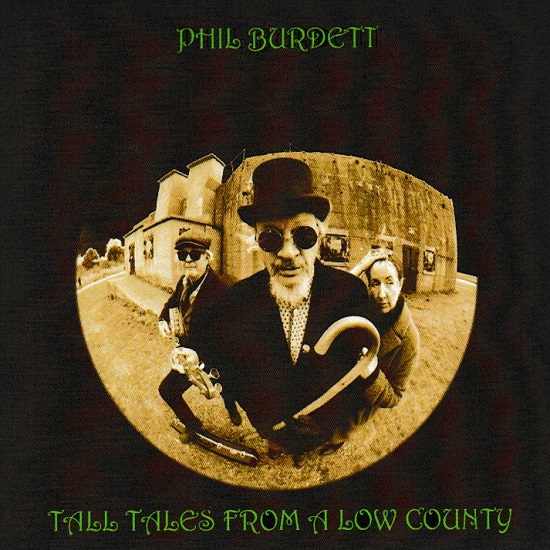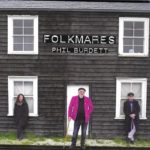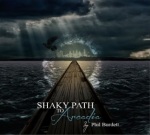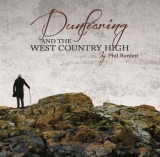
Not so much of an album review as a dispatch from the front lines. Since his serious health difficulties five years ago, Phil Burdett’s become the prolific polymath of the Thames Estuary. He’s always been a singer-songwriter of the highest calibre as a live and recorded artist, but he’s broken out of those shackles since with 2016 by publishing and performing poetry, writing prose, directing film and doing some painting as well. The latest news is that he’s released “Tall Tales from a Low County”, a companion piece to last year’s “Folkmares” album with a similar theme of the East End Essex diaspora, the demographic transition from London’s dockland to the estuarial towns, old and new.
“Tall Tales from a Low County” features two long-term Phil Burdett collaborators, Steve Stott (playing fiddle, mandolin, banjo and ‘weird guitar’) and Colleen McCarthy (piano and vocals). Alongside Phil’s contributions on guitar (including, unusually, a bit of electric), programmed percussion, organ, accordion and some digital orchestration, they create soundscapes that match the meandering progress of the Thames and various points along its course. And you’re never too far away from some birdsong (or even seagulls) and tidal susurration along the way.
As with all of Phil Burdett’s albums, you can listen on a superficial level and thoroughly enjoy the experience, but the deeper you dig into the lyrics, the more satisfying it becomes. Phil puts the time into researching his themes; if you do the same you’ll enhance your experience of the entire piece, pulling together history, sociology and geography to tell some of the human stories of the river that made London and the south-east, from its meandering source to its meeting with the North Sea.
“Tall Tales…” opens with an ethereal exploration of London’s lost rivers, “Hush River Blind”, the arrangement conveying the menacing, claustrophobic atmosphere of subterranean rivers in culverts under England’s capital, all ultimately feeding out into the Thames on its journey to the estuary in the same way the songs broaden out to cover the lore of the river and the people that exist in a state of mutual dependence with it. I won’t force-feed you my opinions of every song (just take my word that they’re all good) but I will pick out some of my favourites.
The second song “Lighterman” has more space in its arrangement led by Phil’s chiming acoustic with the accordion (Phil again) and fiddle creating a sea shanty feel emphasised by Colleen and Phil’s layered backing vocals. The slow pace reflects the speed of the job done by the lightermen (now largely vanished), who moved the cargo from ships moored in the Thames to the shore (usually unpowered) before the heyday of the docks and their subsequent decline as a result of container ships. It’s a song in praise of people who did a highly skilled job using mainly the tides until a ‘better’ method evolved.
“Plotland Pioneers” is Phil Burdett at his very best, combining personal memories with social history in a slow country rock setting with a subtle combination of electric and acoustic guitars capturing a 1979 vibe perfectly, which is used as a narrative framework to timeshift back to the end of the nineteenth century, when land around Laindon that was uneconomical to farm was auctioned off in plots and bought mainly by people from the East End and developed as holiday or retirement homes. The infrastructure was non-existent (and don’t even ask about planning permission), but somehow the pioneers made it work until the area became part of the Basildon New Town project and was demolished from 1949 onwards. There’s even a reference to the companion album, “Folkmares”, slipped in there as well.
“Bow Bells, Shoebury Gun” is in the same mould, combining the progress of the river to the North Sea with a very personal spoken word memoir of childhood days in Basildon. It’s taken at a very leisurely pace as it drifts backward and forward in time and place, creating a haunting feel and a sense of displacement and exile. There might even be a slight nod in the direction of Leonard Cohen with the line: ‘Where are the cracks through which the sunlight shone now everything is gone?’ It’s a tour de force.
Almost everywhere you look on the lyric sheet (oh, the packaging’s superb as well, with stunning photography by Robert Shaw), there’s an interesting reference: Joseph Conrad, William Blake, the Great Dock Strike, the Crow Stone and London Stone (the Thames boundaries of the City of London) and so on. And could the line ‘The union’s gone and the chancer’s beer is tasteless’ be a reference to anyone other than Tim Martin? I do hope so. At a time when curmudgeonly old musicians are making songs in support of the anti-vaccine lobby and COVID deniers, maybe it’s time to listen to a songwriter that still has something interesting to say and an interesting way of saying it.
“Tall Tales from a Low County” is out now and you can show your support for a genuine British original by buying it here. Phil’s playing a gig to launch the album in St Mark the Evangelist Church, Southend on Saturday September 11th and I hope I’ll see you there.
And the rest of the news? Phil’s directorial film debut is ongoing (with cameo appearance from Wilko Johnson as a vicar) and the third album of Phil’s Cornish trilogy is now in pre-production with studio recording coming up fairly soon. He’s not hanging about.
Here’s a video clip for “Lighterman”:
 Phil Burdett; the eternal iconoclast. The most characteristic line of the album for me is ‘antagonize a purist’ from the album’s closing song “Newport Electrics”. The song, and the message, are built around Dylan’s infamous electric performance at the Newport Folk Festival in 1965, although the intro hints at the Hendrix performance of “The Star-Spangled Banner”. It doesn’t actually typify the album; it’s twice as long as most of the songs and three times longer than some and it has a psychedelic, hippy-trippy vibe with Indian percussion and hints of Ravi Shankar’s influence. You can fill your boots checking out the Dylan references, but there’s more buried there in the story of how music constantly evolves in the line ‘the strummer’s fix is in’ – is it the frontman of The Clash or a general reference to three chords and the truth guitar players? You decide.
Phil Burdett; the eternal iconoclast. The most characteristic line of the album for me is ‘antagonize a purist’ from the album’s closing song “Newport Electrics”. The song, and the message, are built around Dylan’s infamous electric performance at the Newport Folk Festival in 1965, although the intro hints at the Hendrix performance of “The Star-Spangled Banner”. It doesn’t actually typify the album; it’s twice as long as most of the songs and three times longer than some and it has a psychedelic, hippy-trippy vibe with Indian percussion and hints of Ravi Shankar’s influence. You can fill your boots checking out the Dylan references, but there’s more buried there in the story of how music constantly evolves in the line ‘the strummer’s fix is in’ – is it the frontman of The Clash or a general reference to three chords and the truth guitar players? You decide.
As always with Phil Burdett albums, you can spend all the time you have unpicking the words and looking for the references. I’m not doing it for you, but I’m just saying it might be worthwhile. Phil will argue that lyrics aren’t poetry because they rely on the music to make them work, but let’s just say they’re written in a poetic style. We can probably agree on that.
“Folkmares” came out of a difficult time for Phil; he has a work ethic that won’t allow him to stop. If he can’t write songs, he’ll paint or write poems or find some other way of creating art. What’s certain is that it won’t be boring or bland: guaranteed.
It’s a home studio recording with Phil singing, playing guitars, keys, bass, percussion and harmonica, while Steve Stott (fiddle and mandolin) and Colleen McCarthy (vocals) supply the folkier elements and a more country, string band sound. Phil’s influences are many and varied and most of them poke their heads over the parapet at some point in the album’s fifteen (yep, fifteen) songs. It’s a nod to the folk tradition that almost a third of the songs on the album are in 3/4 time, and those are some of the most poignant songs. I bet you want to know what some of the songs are about as well.
The album looks back to an earlier time in Phil’s life, not through the rose-tinted sunglasses of nostalgia, but the telephoto lens of realism, with absolutely no filters. The songs are set in either central London (Soho, Camden, you get the picture) and south-east Essex (Basildon and Canvey). The London settings have the feel of a Patrick Hamilton novel fifty years on at the start of the Thatcher era (looking forward as well in “Albion Caustic”), with scenes in pubs and an interesting array of characters. There aren’t too many happy endings either.
The Essex songs are set in a slightly earlier and maybe more innocent period, shining a bit of light on a time of life where everything seems possible yet impossible at the same time. We’ll start there for favourites. “New Factory Hand” (in ¾ time) evokes with concise phrases the stark reality of working life in the late sixties and early seventies and how we escaped from it, while the song following, “From a Van on the Coryton Road” is set just before the Thatcher era capturing the drudgery of dead-end jobs around Canvey Island and again the escape, ‘When Friday rolled by we would lead our wage packets to drink’.
I’ve already mentioned “Newport Electrics” a very personal take on the history and hypocrisy (bit of Jane Austen there, sorry) of the folk scene while “The Last March” does the same for the march and demo movement of the mid-eighties and the ‘I was there’ pose. You could update it for 2020 and call it “The Last Petition”. While we’re with the stupid ideas, the busker’s anthem “Flatpicking Sorrows on Borrowed Guitars” could be filmed by Wim Wenders as “The Busker’s Hatred of Brown-Eyed Girl”. Just sayin’.
What else? The packaging of course. Phil likes to include a lyric booklet and this time the photography (by Steve Stott and Rob Shaw) and the design, layout and graphics (by Steve Stott) combine to create a perfect setting for the lyrics. Bloody good job all round, I say from the Southend massive and a namecheck for John Bulley because I don’t want to leave him out.
While we’re all going stir-crazy, why don’t you treat yourself to a big helping of lyrics that will actually make your brain work and some really interesting musical settings.
“Folkmares” is out now and it’s available here. You won’t spend a better tenner before the lockdown ends.
Bit of a video taster before you go? Thought so:
 It’s difficult enough working out where to start a Phil Burdett review at the best of times without having to contend with an album that doesn’t actually start or finish anywhere. The clue’s in the song title “Sisyphus on Denmark Street”; the songwriter condemned forever to push a stone uphill. It could be worse; look what they did to Prometheus. The album cycles continuously from the birth of the dawn in “Net of Joy” to the dusk and senescence of “Dotage Train” and back to the beginning again, linked by the phrase ‘heavy miles to go’ in each song. Reincarnation without any upward or downward mobility and inspiration from the unholy poetic trilogy of William Blake, John Clare and Arthur Rimbaud.
It’s difficult enough working out where to start a Phil Burdett review at the best of times without having to contend with an album that doesn’t actually start or finish anywhere. The clue’s in the song title “Sisyphus on Denmark Street”; the songwriter condemned forever to push a stone uphill. It could be worse; look what they did to Prometheus. The album cycles continuously from the birth of the dawn in “Net of Joy” to the dusk and senescence of “Dotage Train” and back to the beginning again, linked by the phrase ‘heavy miles to go’ in each song. Reincarnation without any upward or downward mobility and inspiration from the unholy poetic trilogy of William Blake, John Clare and Arthur Rimbaud.
If you’re part of the generation that doesn’t listen to albums, this isn’t for you; “Psychopastoral” is designed to be heard in a certain order, start to finish and then again and maybe once more, just to be sure that it is actually a work of genius. Phil’s taken a simple approach to ensuring we listen to everything in the intended order; the entire album’s one track with songs connected by musical and lyrical fragments. Does it work? Bloody right it does; at just under an hour, the images, fragments and melodies rush past at breakneck speed then start all over again bringing fresh musical and verbal marvels to discover.
I could spend hours going into minute detail about every aspect of this album, but that’s not going to help anyone, so I’ll try to pick out some of the attention to detail that permeates every aspect of this beautiful piece of work. How about the musicians? The core of this ensemble has been with Phil for a few years now and each one brings their own individual talents to a great ensemble sound. John Bennett (guitar) is one of my local heroes; comparisons with Steve Cropper are more than justified – not showy, but everything fits perfectly. Steve Stott adds colour and texture with bright mandolin and melancholy fiddle and Colleen McCarthy’s backing and lead vocals are a pure and clear foil for Phil’s soulful growl. And of course, Russ Strothard’s melodic bass playing, Lyndon Morgan’s spoken word contributions and the samples and programming contributed by Al Franklinos.
Phil’s voice sounds as good as I’ve ever heard it and the words are as densely packed with meaning and allusion as ever. I’m not going to bore you with my amateur literary criticism, you can delve into the layers of meaning for yourself (there’s a lyric booklet as part of the CD package); you’ll find it packed with autobiographical references both pleasurable and painful alongside the odd skewed musical reference (‘needles of death and the damaged rum’ from “Sisyphus on Denmark Street”).
I’m a huge admirer of Phil’s work, particularly from “Dunfearing and the West Country High” onwards and with “Psychopastoral”, he’s made an unflinching, uncompromising album that flies in the face of convention in its stance on sequencing and playback. There are some memorably catchy songs embedded in the piece, and Phil’s determined that they stay embedded and we hear them as part of the overall creation. It’s an ambitious project, but it’s perfect in every little detail. Favourite album of the year so far? I think so.
“Psychopastoral” is out now you; can order it direct from Phil’s website.
 It’s not just Edinburgh that has a festival in August. What about Southend? Maybe not as fashionable but there’s a great arts scene around Southend and its satellites. So, on a beautiful sunny Saturday afternoon, why not head out to have a look at The Railway Hotel’s contribution to the Estuary Fringe Festival which is an afternoon session in the beer garden followed by more live bands inside in the evening. I got there just as the belly dancing was finishing and the stage was being set up for live music (with background music leaning heavily on blues classics and some nice Al Stewart songs).
It’s not just Edinburgh that has a festival in August. What about Southend? Maybe not as fashionable but there’s a great arts scene around Southend and its satellites. So, on a beautiful sunny Saturday afternoon, why not head out to have a look at The Railway Hotel’s contribution to the Estuary Fringe Festival which is an afternoon session in the beer garden followed by more live bands inside in the evening. I got there just as the belly dancing was finishing and the stage was being set up for live music (with background music leaning heavily on blues classics and some nice Al Stewart songs).
First on stage was Pick Yer Feet Up, or Eleanor Donne (fiddle) and Dave Murray (twangs and bangs) playing a selection of ‘bogus Bulgarian bangers’. It was relatively low-key but very melodic in an Eastern European way with a nice line in dry patter from Dave between songs. In the great old Python tradition of ‘now for something completely different’, next up was Dirty Captain Scott. What can I say? A twentieth-century estuary poet backed with cajon beats (and guitar towards the end of the set). The rhythms were insistent and the delivery, well, imagine Adele rapping and you’re most of the way there. A great set that you just couldn’t ignore.
Next? The Timlins (Matt and Victoria) played a lovely set of melancholy (maybe even miserable) songs, reminding me a lot of Turin Brakes and (bonus points if you remember this band) Budapest. Victoria’s keyboard filled out the textures created by Matt’s acoustic guitar and the harmonies were sublime. Personally, I like a bit of miserable; always have. Dead Air next, playing their first (and possibly only) gig, played a set of folky Americana with a female lead singer, acoustic guitar and mandolin backing and some lovely harmonies. If you wanted a backing track for an English summer day you wouldn’t go far wrong here.
And on to Phil Burdett, backed by long-term collaborators John Bennett (guitar), Steve Stott (mandolin and fiddle) and Colleen McCarthy (backing vocals). This was only Phil’s second live appearance after major surgery earlier in the year and he was a man on a mission, determined to get songs from his two (yes, two) new albums out there in a live setting. Throughout the set, the arrangements were a masterclass in understatement; the instruments created a framework that allowed the songs to shine. John Bennett is subtle and understated in a way that reminds me a lot of Steve Cropper; no fuss, but just try to imagine The MGs without the guitar parts. Even “New Greyhound Rag”, which was written as full band piece with bass, drums and various other bits of percussion is driven along nicely by the two guitars.
But just focus on the songs. From the opener “Sea Change” to “A Kind of Chalkwell Station Blue”, the short set was packed with melodic and lyrical invention. The lines ‘you switch the channel in your mind – and on the news voices buzz like cracked kazoos the needle stuck on tombstone blues’ are a great example of Phil’s ability to create a striking, evocative image. All delivered to perfection in Phil’s mellow growl. You really shouldn’t get music this good for free in a pub beer garden, even if the pub is The Railway.
I’m looking forward to seeing Phil officially launch “Humble Ardour Refrains” and “Shaky Path to Arcadia” on November 5th in Southend.
If you haven’t seen them before, here are some pictures of the event.
 Every time I hear some delusional, no-talent wannabe on a TV talent show (not often, I admit) it should make me despair for music in the twenty-first century. The reason it doesn’t is that I know about people like Phil Burdett, a genuine visionary who’s about as far as it’s possible to get from the epicentre of what masquerades as the music business today. When I interviewed Phil about eighteen months ago in downtown Leigh-on-Sea, he told me that he was working an album to follow “Dunfearing and the West Country High” as the second part of the “Secular Mystic Trilogy”. Not only that but he was also working on another trilogy that would begin with “Humble Ardour Refrains”. So, on a budget of threepence-halfpenny and some lollipop sticks, he’s recorded two albums for Drumfire Records with some fabulous musicians from the Southend and Canvey area (more about the musicians later) and he’s releasing both of them at the same time.
Every time I hear some delusional, no-talent wannabe on a TV talent show (not often, I admit) it should make me despair for music in the twenty-first century. The reason it doesn’t is that I know about people like Phil Burdett, a genuine visionary who’s about as far as it’s possible to get from the epicentre of what masquerades as the music business today. When I interviewed Phil about eighteen months ago in downtown Leigh-on-Sea, he told me that he was working an album to follow “Dunfearing and the West Country High” as the second part of the “Secular Mystic Trilogy”. Not only that but he was also working on another trilogy that would begin with “Humble Ardour Refrains”. So, on a budget of threepence-halfpenny and some lollipop sticks, he’s recorded two albums for Drumfire Records with some fabulous musicians from the Southend and Canvey area (more about the musicians later) and he’s releasing both of them at the same time.
“Shaky Path to Arcadia” carries on where its predecessor left off, looking west towards the USA from Cornwall, but it’s a metaphorical and musical destination and it’s not the only direction the album goes in, geographically or temporally, before returning to Cornwall to complete the cycle. Without slipping in to ‘sixth-form-literary-criticism’ mode, I’m going to say that there’s a lot going on lyrically and the deeper you dig, the more precious stones you’ll unearth. The lyrics are strewn with references to American music and culture; there’s no mistaking the reference point for “Christmas in Casablanca”, but elsewhere there are references to Joe Hill, Billie Holiday, Dylan, Little Richard and many, many more. There are Dadaist references, travel references (trains, boats and buses and almost a plane) and if you look really closely, a lot of references to Basildon. There’s a lot of autobiography in there, but you need to know where and how to look.
Even without the lyrical content, you could listen to the album and be enthralled by Phil’s rich, powerful vocals and the performances of the band over a wide range of styles. From the mainly acoustic opening song, “Returning to Earth” to the counterpoint vocals in the coda of the album’s closer “I Dreamed I Saw Carl Wilson Last Night”, the band sounds superb. It’s ensemble playing at its finest; particularly on “Hellbound & Innocent” where a melodic bass line from Russ Strothard, an insanely catchy clipped John Bennett guitar hook and Jack Corder’s drums recreate the clickety-clack of the train on the track to perfection. Dee Hunter’s piano is the perfect foil for Phil’s voice on the haunting “Christmas in Casablanca” while Steve Stott’s fiddle on “Come Out Without a Hat (It’s Bound to Rain)” and “New Greyhound Rag” give an authentic country/bluegrass feel to the songs. And let’s not forget Colleen McCarthy’s lovely backing vocals and producer Mark Elliott’s esoteric samples.
“Shaky Path to Arcadia” is an example of how good an album can be when it’s put together by people who love what they do and they do it very, very well. Put the players together with another superb set of songs from the polymath poet of Westcliff-on-Sea and you’ve got a very fine album indeed. Any proper record collection should have some Phil Burdett in it and this is as good a place as any to start. “Humble Ardour Refrains” coming soon.
“Shaky Path to Arcadia” and “Humble Ardour Refrains” are both available to pre-order now from Drumfire Records.
 What a great start we’ve had to 2014. We’ve already reviewed some cracking albums in various genres and now we’ve got another. “Dunfearing and the West Country High” is Phil Burdett’s first album to be released on Twickenham-based Drumfire Records and it’s very, very good. If you’ve seen Phil Burdett play live, you’ll know that he has a powerful, rich baritone voice and is an accomplished acoustic guitar player. He learned to play at the age of six, was in a pre-Depeche Mode band with Martin Gore and has pursued a winding and sometimes messy path through the music scene in the south-east of England ever since.
What a great start we’ve had to 2014. We’ve already reviewed some cracking albums in various genres and now we’ve got another. “Dunfearing and the West Country High” is Phil Burdett’s first album to be released on Twickenham-based Drumfire Records and it’s very, very good. If you’ve seen Phil Burdett play live, you’ll know that he has a powerful, rich baritone voice and is an accomplished acoustic guitar player. He learned to play at the age of six, was in a pre-Depeche Mode band with Martin Gore and has pursued a winding and sometimes messy path through the music scene in the south-east of England ever since.
It’s obvious from the first listen that Phil isn’t just a songwriter; he’s a true poet. You can find any number of musical influences listed in previous reviews but you should probably add James Joyce and Dylan Thomas to that list. A quick word of advice here, don’t download this album, buy the CD; the packaging, designed by Fish Inton, is gorgeous and contains a booklet full of evocative photos and all of the lyrics.
It’s usually a pretty easy job to explain the subject of a song, but it can be a real challenge on “Dunfearing…” as Phil slips sinuously between the mundane and mystical. Even a song as seemingly grounded as “Small Talk at Sullivan’s Diner” descends quickly from the simple narrative to a deeper and darker examination of tortured souls struggling to cope with real life. The songs with a clear narrative thread are inspired by the history of Cornwall and the West Country, “Gothic Miner” and “Fate of Pirates”, for example, while “New York City Call” and “Columbus and Hope” emphasise the area’s historical links with the New World. There’s a batch of songs (“First and Last”, “Song of the Lamp”, “See the Sunset Slow and Beckon True”, “Rimbaud’s Ghost, Chapel Street & Union” and “Winter Halls”) which take inspiration from Phil’s recent Cornish sojourn, and the fatalistic “It’s Where ye Have to Go”.
Which leaves the album’s closing song, “Night Horses of the Wireless Road” to take all of these strands and pull them into an epic, mythical, stream of unconsciousness. The entire album is lyrically dense (both in volume and meanings) and the final song typifies this with references to art, music and fables, before moving abruptly into harsh reality with the news of the death of Jackie Leven, to whose memory the album is dedicated. Musically, “Night Horses…”, has echoes of Neil Young with Crazy Horse at their most laid back or maybe even John Martyn at his best. It has the same unsettling, alienating effect as The Afghan Whigs’ 1996 album, “Black Love”, particularly the closer, “Faded”.
I’m not saying this is an easy listen, but it’s worth putting in the effort. You might even have to do a bit of research on phrases like “mise-en-abyme” (you can look it up for yourself) and some of the more obscure references. Phil’s rough-hewn baritone voice and acoustic guitar (with a hint of Johnny Cash at times) are sympathetically supported by John Bennett (guitars), Steve Stott (mandolin/fiddle), Russ Strothard (bass guitar), Jack Corder (drums), Dee Hepburn (piano), Colleen McCarthy (backing vocals), Wag Porter (fiddle) and Mark Elliott (percussion) throughout the album; the playing isn’t particularly showy, but it creates a perfect backdrop for the modern folk and slight country leanings of the songs.
If you want a particularly geeky fact to impress your friends with, there are nearly thirty drinking references in the album’s lyrics, including pub names, drink names and general drinking terms, including one reference to rehab; you can take what you like from that, but I’m guessing that Phil enjoys a beer. This is an album which visits some very dark places, but closes with a heartfelt farewell to a fellow troubadour as part one of the proposed “Secular Mystic Trilogy” closes.
Out Monday March 3rd on Drumfire Records (DRMFR016).


